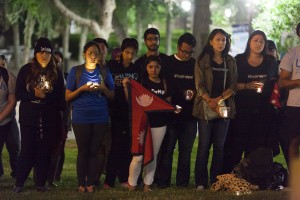She first learned that there was an earthquake in Nepal when she logged on to Facebook Saturday morning.
Asha Bhote, who was born in Kathmandu, the capital of Nepal, still has family and friends living in the city. She said she immediately began messaging them on Facebook Saturday, looking for signs that they were all right.
A magnitude-7.8 earthquake struck Nepal, a landlocked country located between India and China, around noon local time Saturday. More than 6,000 people are confirmed dead, more than 11,000 injured, and more than 70,000 homes were destroyed, with the death toll expected to rise, according to BBC News.
“It was really hard to get in contact with (my family and friends) after the earthquake, but so far it seems that no one is hurt, so I’m very thankful,” said Bhote, a second-year human biology and society student.
She said that although her family is okay, some of her childhood friends now have to live in tents outside Kathmandu because their homes were destroyed.
“There is so much damage that I’m not sure how they are going to rebuild it,” she said. “We just have to pull through.”
UCLA South Asian student groups started an online fundraising campaign Saturday to aid the relief effort in Nepal and held a vigil Thursday to honor the victims.
The vigil, which about 80 students attended, started with an introduction from Rafay Haseeb, president of the South Asian student group Indus and a third-year political science student, and Archana Reddy, vice president of Project RISHI and a third-year biology and sociology student. They said they hope to raise $2,000 to $2,500 through their online campaign and by selling wristbands saying “Hope 4 Nepal” for $3 next week on Bruin Walk.

Then, after a performance of “Mere Nepal,” which means “My Nepal,” several members of the UCLA community and other non-UCLA organizations spoke about how they were affected by the earthquake and what students can do to help.
Noora El-Koussy, who works for Operation USA, an agency that is providing relief in Nepal, talked about how aid agencies handle humanitarian crises, and encouraged students to be patient throughout the process.
“Mistakes will happen, it is baby steps, but the world will not let Nepal fall,” she said.
The damage and loss of life in Saturday’s earthquake was extensive because the epicenter of the quake was near Kathmandu, a major population center and capital of the country, said Jonathan Stewart, a UCLA professor of civil and environmental engineering and an earthquake expert.
Nepal is particularly earthquake-prone because it lies where the Indian plate collides into the Eurasian plate, Stewart said. The last major earthquake in Nepal was in 1934, when more than 10,000 people died.
“The quality of construction (in Nepal) is very poor and not designed to withstand earthquakes,” he said. “So it’s not surprising that the damage is this high, but that does not make this any less tragic.”
Haseeb said after news of the earthquake came out, he reached out to his friend Naeha Lakshmanan, a third-year microbiology, immunology and molecular genetics student who has family in Kathmandu, and asked how he could help. Haseeb said Lakshmanan connected him with a family friend who runs a nonprofit organization providing aid in Nepal called Sahayeta, which in Nepali means “to assist.”
Project RISHI wanted to help Sahayeta, which is providing tents and improving water sanitation in Nepal, because it focuses on providing aid in rural areas she thinks are not always covered by major international aid organizations, said Reddy.
Lakshmanan, who connected Indus and Project RISHI with Sahayeta, said she thinks the rural areas of Nepal are the most vulnerable and need the most help.
Dikshita Poudel, a third-year neuroscience student who has extended family in Nepal, said that while she is thankful her family survived the quake, she is worried for the rest of her community.
“We’re such a small community that if one of us is affected, it’s like a member of my own family is affected, but I think we’re resilient, and we will make it through this with the help of foreign aid,” Poudel said. “It’s nice to see we are not alone.”
